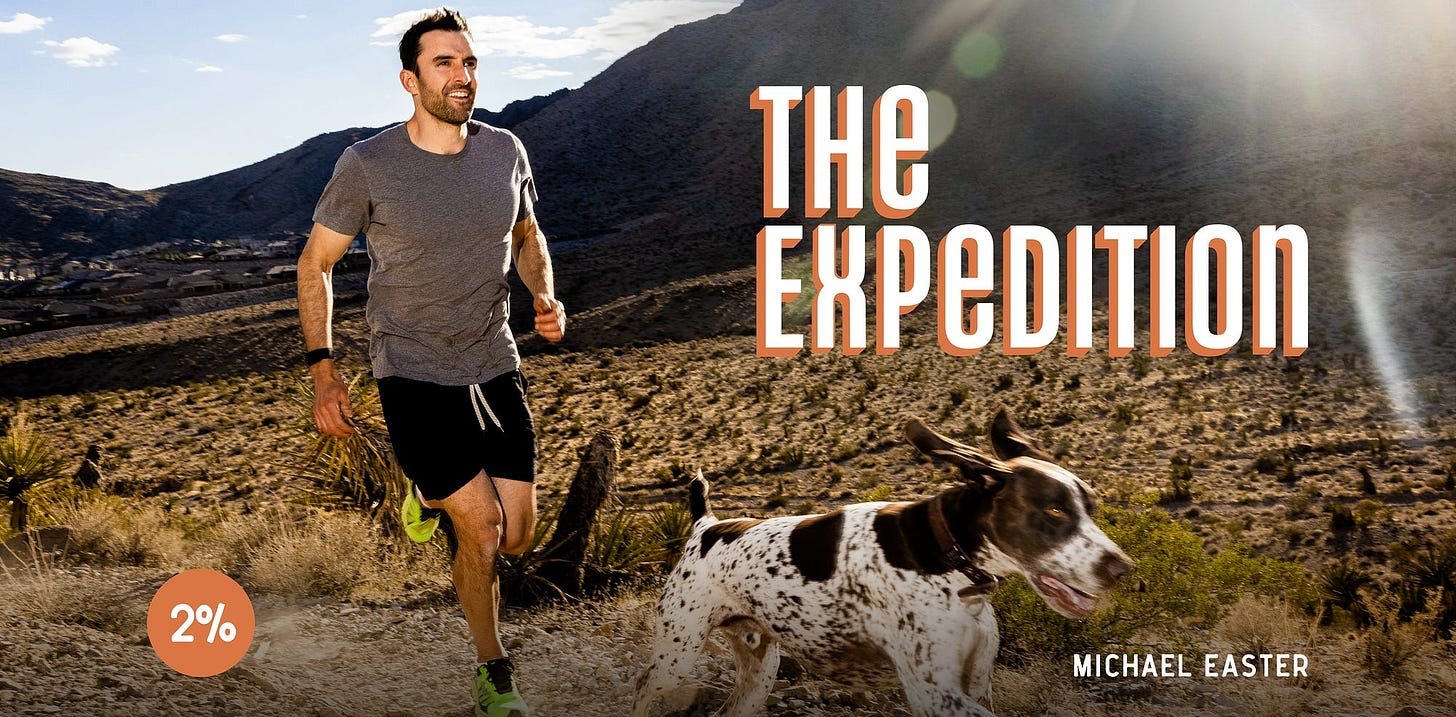The Expedition: October Edition
The most useful stuff I’ve discovered exploring the world and the internet this month.
We’ll cover: Two great books I’m reading, numbers on parenting and exercise, a graph that’ll shock you, the truth about low-carb diets, a healthy food trick, a rucking exercise, and more.
Notes:
The full version of this premium post is for Members, who are people who want to have fun and not die.
If you’d like to access all 2% premium content and have fun and not die, please consider becoming a Member below. To paraphrase PBS, “This program was made possible by readers like you.”
Another way to become a Member: Share 2% with friends. If your friends sign up, you get a free membership.
Also, an important question: Did you or did you not Burn the Ships today? The workout is adaptable to any ability level, and the goal is simple: finish better than you started.
Onto today’s post: The Expedition
This series is a journey into thoughts, opinions, ideas, observations, studies, facts, figures, etc. Good ones, bad ones, insightful ones, dumb ones, and ones you can use to live better.
It’s a roundup of all the worthwhile stuff I’ve encountered in the last month. It’s a bit of an island of misfit toys. But, hey, the greatest journeys are winding. We’re covering:
Books I’m reading
Numbers on parenting, exercise and mental health, marathon times, gambling pigeons, and more …
A graph that’ll make you take a walk
The truth about low-carb dieting and helicopter parenting
How to make better coffee
A healthy food trick
An exercise to improve your rucking
Wise words on despair
Enjoy …
Books I read: Wild Problems; Building a Non-Anxious Life
Wild Problems
We live in a world where we can use all sorts of numbers, data, and figures to make decisions. For example, we can trust a five-star review to decide where to eat dinner, use the Waze app’s algorithm to beat traffic, or rely on study data to determine how much food to eat.
This is all good. But Russ Roberts—host of EconTalk, one of my favorite podcasts—asks, “what do you do when you face the big decisions of life—the ‘wild problems’ of who to marry, whether to have children, where to move, how to forge a life well-lived—that can’t be solved by measurement or calculation?”
Wild Problems is an exploration of how to address those … wild problems. Life, he argues, is less a problem to be solved than a mystery to be experienced. Reality is harder than that—and perhaps a little more interesting than anything we can quantify.
Building a Non-Anxious Life
Mental health books can get touchy-feely. Too woo-woo.
This is not one of those books. John is a regular dude who happens to have two PhDs. He’s one of the world’s foremost experts on mental health. His wisdom is empathetic yet straightforward. I blurbed this book and wrote:
Everyone has anxiety in some form or another. It seems to be the defining condition of modern human brains. But until now, there’s been no go-to manual that can help anyone, no matter their background, understand the science and soul of the problem—and also find solutions. Building a Non-Anxious Life is that manual. Its wisdom is wide and deep and delivered in a way that’s empathetic, straightforward, and true. This book will help you unpack the deeper reasons why you’re anxious and provide you with actionable tools that lead to lasting freedom.
Get Building a Non-Anxious Life
By the numbers
25
Percent of children who regularly play on their street. That figure used to be 80 percent.
Source: The wise Brad Stulberg.
97
Different studies that were included in a wide-ranging review of how exercise impacts mental health. The finding:
Physical activity is highly beneficial for improving symptoms of depression, anxiety and distress across a wide range of adult populations, including the general population, people with diagnosed mental health disorders and people with chronic disease. Physical activity should be a mainstay approach in the management of depression, anxiety and psychological distress.
2:00:35
Time it took Kelvin Kiptum to finish the Chicago marathon, a new world record marathon time. That’s a 4:36 minute-per-mile pace.
Most people couldn’t run a quarter of a mile at that pace.
180
Dollars it took for people to agree to deactivate their social media accounts for four weeks.
The upshot: The people who deactivated “experienced more happiness, less anxiety, and greater life satisfaction.”
97
Percent of pigeons that will choose a gambling game over a game that gets them significantly more food.
5
Percent of Lauren Weeks’ weekly training that is “very intense.”
She’s one of the most successful competitors in the history of hybrid fitness racing. Ten percent of her week’s training is medium effort. The remaining 85 percent is low-intensity.
The takeaway: Even sports with a strength element benefit from most training being in the low-intensity zones.
This comes from The Hybrid Letter, a great new Substack on hybrid athletics.
A shocking graph that’ll make you take a walk
Keep reading with a 7-day free trial
Subscribe to Two Percent with Michael Easter to keep reading this post and get 7 days of free access to the full post archives.



